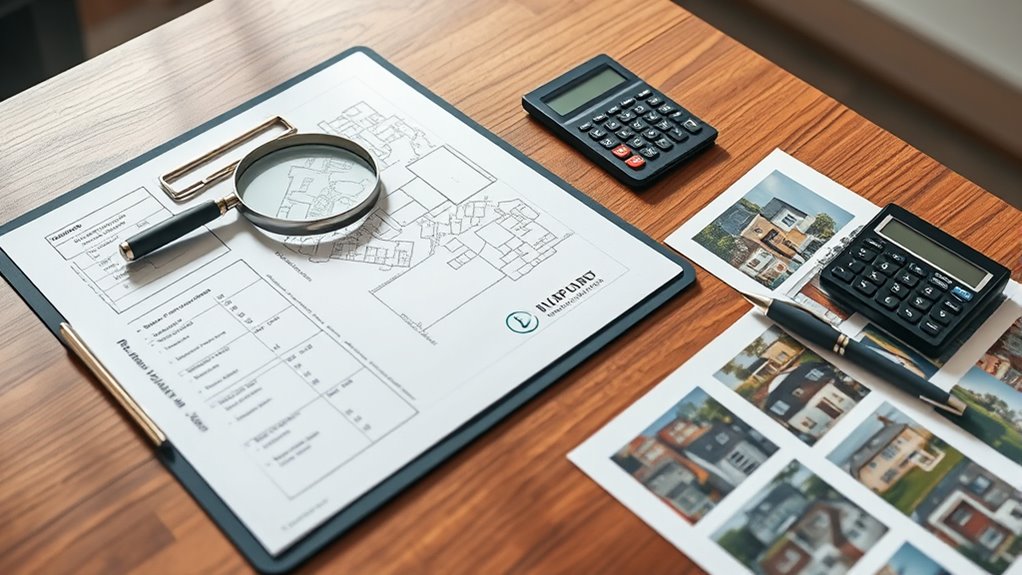When preparing for asset division, start with a detailed property valuation checklist that includes gathering all relevant documentation like purchase agreements, recent appraisals, and tax records. Conduct a thorough inspection of the property, note any improvements, repairs needed, and assess the current market value using comparable sales. Consider regional economic trends and property-specific features. Following this guide helps guarantee a fair division process, and if you keep exploring, you’ll discover more tips to strengthen your case.
Key Takeaways
- Gather comprehensive property documentation, including purchase agreements, recent appraisals, and records of improvements.
- Select appropriate valuation methods (sales comparison, cost, income) based on property type.
- Conduct a thorough property walk-through to identify necessary repairs or upgrades.
- Analyze recent market sales, listings, and local economic trends to benchmark property value.
- Ensure appraisal readiness by organizing all relevant documents and providing clear property details.

When you’re preparing to sell or refinance a property, having a detailed valuation checklist can make the process much smoother. One of the first steps is understanding how a property appraisal works, as it’s the foundation of most valuation efforts. A property appraisal involves a professional appraiser evaluating your property’s value based on various factors. Knowing what to expect during this process helps you gather the right documentation and anticipate the appraisal timeline. It’s also essential to familiarize yourself with different valuation methods, which can influence the appraisal outcome. These methods typically include the sales comparison approach, the cost approach, and the income approach. Each method provides a different perspective: the sales comparison looks at recent sales of similar properties, the cost approach estimates the cost to replace the property minus depreciation, and the income approach evaluates potential income if the property is income-generating. Identifying which method applies best to your property can help you prepare accordingly and ensure the valuation is accurate.
Understanding appraisal methods helps ensure accurate property valuation and smooth selling or refinancing processes.
Next, you should compile all relevant property documents. These include the original purchase agreement, recent appraisals, property tax records, and any renovations or improvements made over time. Having these ready not only speeds up the appraisal process but also provides the appraiser with thorough information to assess your property accurately. It’s also wise to perform a self-assessment of your property’s condition. Walk through each room and note any repairs or upgrades needed. A well-maintained property can positively influence the valuation, especially if you plan to present it during the appraisal. Consider making minor repairs or cosmetic improvements to boost appeal, but avoid overspending on renovations that won’t substantially increase value. Additionally, understanding the property valuation methods used by professionals can help you better interpret the appraisal results and advocate for your property’s worth.
Furthermore, you should analyze comparable properties in your area. Look at recent sales and current listings similar to yours, considering size, location, amenities, and condition. This research helps you understand the market and provides a benchmark for your property’s value. When discussing valuation methods with professionals, be clear about which approach aligns with your property type. For example, a rental property might be more accurately valued using the income approach, while a single-family home usually relies on sales comparison.
Finally, be aware of local market trends. Fluctuations in property values, economic conditions, and regional developments can impact your property’s worth. Keeping informed allows you to set realistic expectations and better negotiate during asset division or refinancing. By following this detailed valuation checklist, you’ll be better prepared for the appraisal process, ensuring a fair and accurate property valuation that supports your goals.
Frequently Asked Questions
How Often Should Property Valuations Be Updated During Asset Division?
You should update property valuations at least annually to account for market fluctuations that impact valuation accuracy. Regular updates guarantee you have current data, helping you make fair asset division decisions. If the market is particularly volatile, consider more frequent assessments. Staying proactive with updates minimizes disputes and ensures the valuation reflects the true worth of your property, making the division process smoother and more accurate.
Are There Specific Professionals Recommended for Property Valuation?
You should hire professional appraisers for property valuation, as they provide accurate, unbiased valuation reports essential for asset division. Look for certified or licensed appraisers with experience in property types similar to yours. Their expertise guarantees the valuation reports are thorough and credible, helping you make informed decisions during the division process. Always verify their credentials to avoid delays or disputes later on.
How to Handle Disagreements Over Property Values?
If you face disagreements over property values, start with open dispute resolution by discussing your concerns calmly. Consider using different valuation methods, like comparative market analysis or appraisals, to reach a fair estimate. If disagreements persist, you might involve a neutral third party, such as a professional appraiser, to provide an objective opinion. This approach helps guarantee everyone feels the division process remains transparent and equitable.
What Legal Considerations Impact Property Valuation Processes?
You need to guarantee legal compliance during property valuation to avoid disputes and potential legal issues. Accurate valuation is vital, so you should follow relevant laws and regulations, such as requiring certified appraisers or adhering to jurisdictional standards. Document all steps carefully to maintain transparency and protect your process. By focusing on legal considerations, you improve valuation accuracy and safeguard the asset division, making the process smoother and more equitable.
Can Digital or Online Valuations Be Trusted for Asset Division?
Like trusting a crystal ball, digital or online valuations can seem tempting, but their accuracy isn’t foolproof. While digital accuracy and online reliability have improved, they still can’t fully substitute professional appraisals, especially for complex assets. You should view these tools as helpful starting points, not definitive answers. Always verify online valuations with a licensed appraiser to ensure fair asset division and avoid surprises down the line.
Conclusion
By following this property valuation checklist, you guarantee a fair division of assets and avoid surprises. Did you know that accurate property valuations can reduce settlement disagreements by up to 50%? Taking the time to thoroughly assess your assets not only saves time but also helps protect your interests. Stay diligent, double-check your figures, and remember: a well-valued property can make all the difference during asset division.










